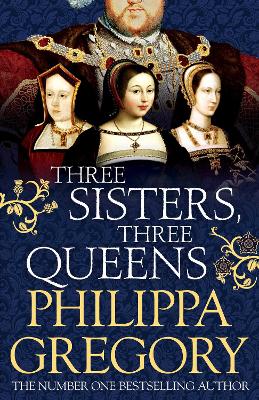Reviewed by jesstheaudiobookworm on
Unfortunately, I gradually became somewhat disenchanted with her work after a few consecutive disappointing experiences with The Red Queen, The Queen’s Fool, and The Virgin’s Lover. In fact, I was never able to make it fully through The Other Queen or The Lady of the Rivers, although I still intend to do so. Yet, I began Three Sisters, Three Queens on a hopeful whim and found it to my liking.
I was a bit worried that I may have outgrown my taste for Philippa Gregory in the years since my last attempt at enjoying her work. But Three Sisters, Three Queens was immensely satisfying, even if it was not exactly what I was expecting it to be. Based on the title, I thought it would be told from three different points-of-view. As presented, the story is a tale of the sisterly bond between Margaret Tudor, Mary Tudor, and Catherine of Aragon, but it is told from the perspective of Margaret Tudor. Although this was Margaret’s story, the theme of sisterhood was clearly evident. These three women’s lives were bound together by the Tudor court and later by Henry VIII’s mistreatment abuse.
The discovery Margaret Tudor’s story was an unexpected, but pleasant, surprise. Margaret’s story is often told in relation to that of others. She was frequently overshadowed in contemporary times and has been often overlooked from a historical perspective as well. She was the older sister of Henry VIII and grandmother of Mary, Queen of Scots, but very little is known about her as an individual historical figure. Because of that, much of Three Sisters, Three Queens is based on assumption. Gregory had very little historical content to draw from, but somehow managed to stretch what little she found into 21 hours of story.
However, I question if Gregory used all of that time wisely. I have no problem sitting through audiobooks of this size, especially if a story needs more time to develop. But as Three Sisters, Three Queens went on, it felt as if Gregory was stretching the story too thin. The latter part seemed to drag on, becoming somewhat redundant, and then ending rather abruptly. She chose to omit certain historical events in Margaret’s life in order to emphasize (possibly over emphasize) others.
I very much enjoyed Margaret as a protagonist and found her to be a more inspirational figure than anticipated. As a character, Margaret was well-developed and I appreciated her flaws, which made her relatable. Philippa Gregory has pulled Margaret Tudor from near the depths of historical irrelevance and presented her as a significant personality in Tudor/Stewart history. I always appreciate being given the opportunity to recognize the triumphs of early female leaders and Gregory’s portrayal of Margaret as, dare I say, an early feminist was extremely enlightening.
Narration review: Bianca Amato narrates all of Philippa Gregory’s Tudor and Plantagenet novels, so I am familiar with her work. However, this was the first time I have heard her narration as an audio reviewer. Amato made a special effort to give each character a distinct voice and accent. In a story featuring several characters of diverse backgrounds, Amato was precise in her judgment of how to voice each accent accurately, articulately and in alignment with the character’s personality. For example, Catherine of Aragon was given a thick Spanish accent, but it did not overshadow the reverence of her words. Amato properly conveyed Catherine’s spirituality, Margaret’s haughty pride, and Mary’s shallow naïveté. In short, Bianca Amato’s performance was a royal treat. ♣︎
Reading updates
- Started reading
- 26 November, 2016: Finished reading
- 26 November, 2016: Reviewed
